
SIAM Journal on Financial Mathematics
Scope & Guideline
Advancing Knowledge at the Intersection of Math and Finance
Introduction
Aims and Scopes
- Risk Measurement and Management:
The journal emphasizes the development and application of mathematical models for measuring and managing financial risk, including advanced risk measures and their implications in various market conditions. - Optimal Investment Strategies:
A core focus is on optimizing investment decisions under uncertainty, taking into account various constraints and objectives, such as utility maximization and risk aversion. - Market Dynamics and Pricing Models:
The journal publishes research on modeling market dynamics, including the pricing of complex financial derivatives, stochastic volatility models, and the effects of market microstructure. - Statistical Arbitrage and Machine Learning:
There is a growing interest in statistical arbitrage strategies and the use of machine learning techniques to enhance financial decision-making and predictive analytics. - Behavioral Finance and Decision Theory:
The intersection of behavioral finance and mathematical modeling is explored, particularly how irrational behavior impacts market outcomes and investment strategies.
Trending and Emerging
- Deep Learning and Advanced Algorithms:
The use of deep learning and other advanced algorithms for financial modeling and prediction is on the rise, showcasing the integration of artificial intelligence in finance. - Dynamic and Stochastic Modeling:
There is a growing trend towards dynamic and stochastic modeling approaches, which incorporate time-varying parameters and processes to better reflect market realities. - Behavioral Insights in Financial Decision-Making:
Research is increasingly exploring the implications of behavioral finance on investment decisions, highlighting how psychological factors influence market outcomes. - Multidimensional Risk Assessment:
The exploration of multidimensional risk measures and their applications in complex financial systems is gaining momentum, reflecting the need for comprehensive risk management strategies. - Cross-Disciplinary Approaches:
Emerging themes include cross-disciplinary approaches that combine insights from economics, statistics, and computational techniques to address complex financial problems.
Declining or Waning
- Traditional Mean-Variance Optimization:
There has been a noticeable reduction in research centered around classical mean-variance optimization, as newer models and methods gain traction, reflecting a shift towards more complex and realistic frameworks. - Static Models of Market Behavior:
Static models that do not account for the dynamic nature of financial markets are less frequently published, as researchers increasingly recognize the need for dynamic and adaptive approaches. - Single-Asset Models:
Research focusing solely on single-asset models is waning, with a trend towards multi-asset and portfolio approaches that better capture the complexities of real-world investing.
Similar Journals

Annals of Finance
Elevating Discourse in Economics and FinanceThe Annals of Finance, published by Springer Heidelberg in Germany, stands as a pivotal journal within the realms of Economics, Econometrics, and Finance. With a dedicated convergence of research from 2005 to 2024, this esteemed publication features thought-provoking articles that address both theoretical and practical aspects of finance, earning it a commendable Q2 category ranking in the 2023 metrics for both Economics, Econometrics and Finance as well as Finance. The journal serves an essential role in disseminating knowledge and fostering advancements in the field, appealing to researchers, professionals, and students alike. Its rigorous peer-review process ensures the integrity and quality of published works, making it a reliable source for cutting-edge findings and discussions within the finance community. For those looking to navigate the complexities of modern finance through rigorous research, the Annals of Finance is an invaluable resource.
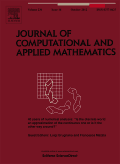
JOURNAL OF COMPUTATIONAL AND APPLIED MATHEMATICS
Elevating Standards in Mathematical ResearchJOURNAL OF COMPUTATIONAL AND APPLIED MATHEMATICS, published by Elsevier, stands as a premier platform for researchers and practitioners in the fields of applied and computational mathematics. With an impressive convergence history from 1975 to 2025, this journal has established itself as a crucial reference point for innovative mathematical theories, methodologies, and applications. Holding a distinguished position in Scopus rankings—#85 out of 635 in Applied Mathematics and #36 out of 189 in Computational Mathematics—it operates in the highly competitive Q2 quartile for both disciplines as of 2023. Although currently not designated as an open-access journal, it remains widely respected for its rigorous peer-review process and high-quality research contributions. Researchers and professionals seeking to advance their work and engage with cutting-edge developments will find this journal an invaluable resource, fostering a deeper understanding and collaboration within the mathematical community.
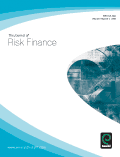
Journal of Risk Finance
Driving innovation in risk finance scholarship.The Journal of Risk Finance, published by Emerald Group Publishing Ltd, is a premier academic journal dedicated to advancing the understanding of risk management and finance practices since its inception in 1999. With a strong foothold within the Q2 rankings in both Accounting and Finance categories, it proudly holds a significant place in the scholarly landscape, ranking #54 out of 317 in the Scopus Economics and Finance category, placing it in the 83rd percentile. The journal aims to facilitate the exchange of innovative research and practical insights, catering to an audience of researchers, professionals, and students eager to explore contemporary issues in risk finance. While not an open access journal, it provides numerous access options, ensuring that essential findings reach a broad readership. Set in the United Kingdom and covering publications up to 2024, the Journal of Risk Finance continues to be an indispensable resource for those committed to this critical field.

FINANCE AND STOCHASTICS
Bridging Finance and Statistics for Tomorrow's ChallengesFinance and Stochastics is a leading academic journal published by Springer Heidelberg, focusing on the intricate interplay of finance, probability, and statistics. With an impressive impact factor and ranked within the Q1 category in both finance and statistics, it serves as an essential resource for researchers and professionals seeking to advance their understanding of stochastic modeling in financial contexts. The journal has maintained a strong reputation since its inception, with contributions from renowned scholars worldwide. The editorial team prioritizes high-quality research that addresses contemporary challenges in financial mathematics and extends the boundaries of statistical methods. Nestled in the heart of Germany, Finance and Stochastics embraces a broad scope, inviting submissions that explore innovative approaches to economic theory and quantitative methodologies. This combination of rigorous academic standards and commitment to impactful research makes the journal a pivotal avenue for disseminating knowledge and fostering collaboration in the finance and statistics communities.
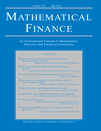
MATHEMATICAL FINANCE
Elevating Standards in Financial AcademiaMATHEMATICAL FINANCE is a prestigious journal published by Wiley, focusing on the interdisciplinary fields of finance, applied mathematics, accounting, and economics. With its ISSN 0960-1627 and E-ISSN 1467-9965, this journal has earned its place in the top tier of academic publications, reflected by its Q1 rankings across multiple categories in 2023, including Accounting, Applied Mathematics, Economics and Econometrics, Finance, and Social Sciences. MATHEMATICAL FINANCE, which commenced publishing in 1991, is recognized for its rigorous peer-review process and its significant contribution to the advancement of knowledge in quantitative finance methodologies and risk management practices. Although it does not currently offer open access, the journal remains an invaluable resource for researchers, professionals, and students seeking to stay abreast of the latest theoretical advancements and empirical studies in mathematical finance. Its impact factor and Scopus rankings further illustrate its high standing within the academic community, making it an essential platform for impactful research and scholarly discourse.
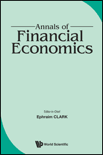
Annals of Financial Economics
Pioneering Research for a Dynamic Financial FutureAnnals of Financial Economics, published by World Scientific Publishing Co. Pte Ltd, is a premier scholarly journal catering to the fields of finance, economics, and international management. With an impressive impact factor and categorized in the Q2 quartile across multiple disciplines in the 2023 rankings, the journal holds a prominent position among its peers, evidenced by its ranking in the top 15% for Economics and Econometrics and Finance categories. The journal aims to foster high-quality, innovative research that addresses contemporary financial issues, making it a vital resource for researchers, professionals, and students alike. Although it does not operate under an open access model, it ensures that its contributions advance scientific discourse and provide valuable insights into financial theories, practices, and policies. With a historical publication span from 2005 to 2009 and again from 2011 to 2024, the Annals remains a critical platform for disseminating transformative ideas in financial economics, ensuring its relevance in a rapidly evolving scholarly landscape.

Journal of Investment Strategies
Navigating the Complexities of Economic DynamicsThe Journal of Investment Strategies, published by INCISIVE MEDIA, is a distinguished periodical focusing on pivotal issues within the realms of economics, finance, and management. With the ISSN 2047-1238 and E-ISSN 2047-1246, this journal has been making strides since its inception, presenting innovative research from 2018 to 2024. Designated in the Q2 category for both Economics, Econometrics and Finance and Strategy and Management as of 2023, it exemplifies its role as a crucial platform for scholars and practitioners who aim to disseminate knowledge and innovative strategies in investment. Although currently not open access, it provides robust insights into finance advocacy, economic dynamics, and strategic management practices. Researchers, professionals, and students alike can benefit from the journal's high-quality contributions that stimulate discussions and advance the understanding of complex investment landscapes, making it an essential resource in the pursuit of excellence in these competitive fields.

Mathematics and Financial Economics
Exploring the Nexus of Numbers and MarketsMathematics and Financial Economics, published by Springer Heidelberg, is a leading peer-reviewed journal that explores the intersections of mathematical theories and financial practices. With an ISSN of 1862-9679 and an E-ISSN of 1862-9660, the journal has made notable contributions to its field since its inception in 2007, with a convergence period extending until 2024. Positioned in the prestigious Q2 category for both Finance and Statistics and Probability, the journal is ranked within the top 66th percentile in Mathematics and Statistics and the 62nd percentile in Decision Sciences according to Scopus metrics. Researchers and professionals looking for high-quality, innovative research in mathematical finance will find valuable insights within its pages. Although primarily a subscription-based journal, it aims to foster knowledge sharing among academia and industry experts. Its commitment to advancing quantitative methods and financial applications solidifies its importance as a resource for students, researchers, and practitioners dedicated to understanding and navigating the complex dynamics of financial markets.

Review of Derivatives Research
Exploring the Depths of Derivatives InnovationThe Review of Derivatives Research, published by SPRINGER, stands as a pivotal platform for the dissemination of innovative research in the fields of derivatives, finance, and economics. Established in 1996, this journal provides deep insights into the theoretical and practical aspects of derivatives markets, catering to a diverse audience comprising researchers, practitioners, and academics. With an impact factor that reflects its significance in the scholarly community, it currently holds a Q2 ranking in the Economics, Econometrics and Finance (miscellaneous) category and a Q3 ranking in Finance, demonstrating its relevance and influence within these fields. Although it does not offer an open-access model, the Review of Derivatives Research remains an essential resource for those seeking to advance their understanding of complex financial instruments and market dynamics from 2002 to 2024. The journal's dedicated focus on the intricacies of derivatives paves the way for significant contributions to both academic research and practical applications in finance.
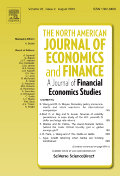
North American Journal of Economics and Finance
Empowering knowledge in the realms of economics and finance.The North American Journal of Economics and Finance is a premier academic journal published by Elsevier Science Inc. since 1992, dedicated to advancing the field of economics and finance through rigorous research and scholarship. With an impressive impact factor and recognition in the Q2 category for Economics and Econometrics and Q1 for Finance as of 2023, this journal holds a significant position in the academic community, ranked #41 out of 317 in Finance and #100 out of 716 in Economics. The journal features high-quality, peer-reviewed articles that cover a broad range of topics, from theoretical frameworks to empirical analyses and practical applications. Though not an open-access platform, the journal provides valuable insights for researchers, practitioners, and students alike, promoting knowledge dissemination in the dynamic landscape of economic and financial studies. With its commitment to excellence, the North American Journal of Economics and Finance serves as an essential resource for those seeking to deepen their understanding of contemporary issues in these critical fields.